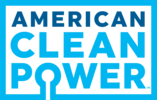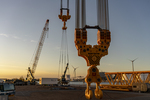News Release from American Clean Power Association (ACP)
Wind Industry Profile of
03/03/2011
AWEA - Statement on Interior's proposed wildlife guidance for wind turbines II
The wind energy industry cannot support the guidance on wildlife issued last week by the Department of the Interior and its U.S. Fish and Wildlife Service (referring to both the wind energy guidelines and the eagle-specific guidance).
The wind industry participated for more than two years in a public, collaborative Federal Advisory Committee (FAC) process, which also included representatives of states, tribes, and leading wildlife conservation groups such as Defenders of Wildlife, National Audubon Society, Bat Conservation International, and The Nature Conservancy. It resulted in consensus recommendations on wind turbine siting that wind energy developers broadly supported.i
Unfortunately, the guidance released last week deviates significantly from the consensus recommendations. Among other problems with the guidance as released, it could:
* Delay construction of projects by up to three years, and require operating projects to retroactively conduct post-construction wildlife studies for a minimum of two and as much as five years, adding unforeseen costs to the operating budgets of these facilities.
* Require "adaptive management", which could include operational changes, such as shutting off turbines at certain times of the year, which will add further unquantifiable costs to even projects already permitted and operating.
* Request analysis on wildlife-based sound impacts without any peer-reviewed scientific evidence that sound related to the construction and operation of wind farms has the potential to impact wildlife.
* Greatly expand applicability under the National Environmental Policy Act (NEPA) to projects built on private lands, adding time and costs to developing wind projects, when there is no federal staff to perform this vastly increased amount of administrative work.
Industry analysts say more than 34,000 MW of potential wind power development, $68 billion in investment, and 27,000 jobs are at risk due to USFWS policies on golden eagles alone. Those numbers are expected to grow exponentially with analysis of the full scope of the proposed guidelines. Therefore they threaten the nation's ability to meet the renewable energy targets set forth by the President and three Cabinet officers just last week.
The wind energy industry has a long history of being proactive on wildlife issues, funding millions of dollars worth of wildlife research and mitigation, including establishing and participating in the American Wind Wildlife Institute, the Bats and Wind Energy Cooperative, the National Wind Coordinating Collaborative, and a habitat conservation plan to conserve Indiana bats and another for whooping cranes and lesser prairie chickens.
Wind power is far less harmful to birds than communication towers, tall buildings, airplanes, vehicles, cats, and numerous other human-caused threats including the conventional energy sources that wind power displaces.ii Wind turbines are estimated to cause fewer than three out of every 100,000 human-related bird deaths in the U.S., and will never cause more than a very small fraction of bird deaths no matter how extensively wind power is used in the future.iii
According to a study by the New York State Energy Research and Development Authority (NYSERDA), non-renewable energy sources "pose higher risks to wildlife" in the New York/New England region than renewable sources, and coal "is by far the largest contributor" to wildlife risks.iv The study, which examined coal, oil, natural gas, nuclear, hydroelectric and wind power, found that wind was the only source that did not present population-level risks to birds.
The industry cannot support the guidelines as currently drafted. AWEA will be providing comments during the 90-day public comment period after the Notice of Availability (NOA) is published in the Federal Register in order to address the issues industry has with the draft guidelines in the hope that they will be revised to be consistent with the consensus recommendations.
For more information about wind power and wildlife, and to request an interview with Tom Vinson, Senior Director of Regulatory Affairs, and John Anderson, Director of Siting Policy, of the American Wind Energy Association, please contact Ellen Carey at 202-249-7357, or ecarey@awea.org.
Please copy and paste the following in to your web browser to view:
i http://www.fws.gov/habitatconservation/windpower/wind_turbine_advisory_committee.html
ii "A Summary and Comparison of Bird Mortality from Anthropogenic Causes with an Emphasis on Collisions," USDA Forest Service, 2005, http://www.fs.fed.us/psw/publications/documents/psw_gtr191/Asilomar/pdfs/1029-1042.pdf
iii "Environmental Impacts of Wind-Energy Projects," National Academy of Sciences, 2007. http://www.nap.edu/openbook.php?record_id=11935&page=72
iv "Comparison Of Reported Effects And Risks To Vertebrate Wildlife From Six Electricity Generation Types In The New York/New England Region," NYSERDA, March 2009, http://www.nyserda.org/publications/executive summary report.pdf
AWEA is the national trade association of America's wind industry, with more than 2,500 member companies, including global leaders in wind power and energy development, wind turbine manufacturing, component and service suppliers, and the world's largest wind power trade show. AWEA is the voice of wind energy in the U.S., promoting renewable energy to power a cleaner, stronger America. Look up information on wind energy at the AWEA Web site. Find insight on industry issues at AWEA's blog Into the Wind. Join AWEA on Facebook. Follow AWEA on Twitter.
For more information on this article or if you would like to know more about what www.windfair.us can offer, please do not hesitate to contact Errol Stryker at es@windfair.us
www.windfair.net is the largest international B2B Internet platform – ultimately designed for connecting wind energy enthusiasts and companies across the globe!
The wind industry participated for more than two years in a public, collaborative Federal Advisory Committee (FAC) process, which also included representatives of states, tribes, and leading wildlife conservation groups such as Defenders of Wildlife, National Audubon Society, Bat Conservation International, and The Nature Conservancy. It resulted in consensus recommendations on wind turbine siting that wind energy developers broadly supported.i
Unfortunately, the guidance released last week deviates significantly from the consensus recommendations. Among other problems with the guidance as released, it could:
* Delay construction of projects by up to three years, and require operating projects to retroactively conduct post-construction wildlife studies for a minimum of two and as much as five years, adding unforeseen costs to the operating budgets of these facilities.
* Require "adaptive management", which could include operational changes, such as shutting off turbines at certain times of the year, which will add further unquantifiable costs to even projects already permitted and operating.
* Request analysis on wildlife-based sound impacts without any peer-reviewed scientific evidence that sound related to the construction and operation of wind farms has the potential to impact wildlife.
* Greatly expand applicability under the National Environmental Policy Act (NEPA) to projects built on private lands, adding time and costs to developing wind projects, when there is no federal staff to perform this vastly increased amount of administrative work.
Industry analysts say more than 34,000 MW of potential wind power development, $68 billion in investment, and 27,000 jobs are at risk due to USFWS policies on golden eagles alone. Those numbers are expected to grow exponentially with analysis of the full scope of the proposed guidelines. Therefore they threaten the nation's ability to meet the renewable energy targets set forth by the President and three Cabinet officers just last week.
The wind energy industry has a long history of being proactive on wildlife issues, funding millions of dollars worth of wildlife research and mitigation, including establishing and participating in the American Wind Wildlife Institute, the Bats and Wind Energy Cooperative, the National Wind Coordinating Collaborative, and a habitat conservation plan to conserve Indiana bats and another for whooping cranes and lesser prairie chickens.
Wind power is far less harmful to birds than communication towers, tall buildings, airplanes, vehicles, cats, and numerous other human-caused threats including the conventional energy sources that wind power displaces.ii Wind turbines are estimated to cause fewer than three out of every 100,000 human-related bird deaths in the U.S., and will never cause more than a very small fraction of bird deaths no matter how extensively wind power is used in the future.iii
According to a study by the New York State Energy Research and Development Authority (NYSERDA), non-renewable energy sources "pose higher risks to wildlife" in the New York/New England region than renewable sources, and coal "is by far the largest contributor" to wildlife risks.iv The study, which examined coal, oil, natural gas, nuclear, hydroelectric and wind power, found that wind was the only source that did not present population-level risks to birds.
The industry cannot support the guidelines as currently drafted. AWEA will be providing comments during the 90-day public comment period after the Notice of Availability (NOA) is published in the Federal Register in order to address the issues industry has with the draft guidelines in the hope that they will be revised to be consistent with the consensus recommendations.
For more information about wind power and wildlife, and to request an interview with Tom Vinson, Senior Director of Regulatory Affairs, and John Anderson, Director of Siting Policy, of the American Wind Energy Association, please contact Ellen Carey at 202-249-7357, or ecarey@awea.org.
Please copy and paste the following in to your web browser to view:
i http://www.fws.gov/habitatconservation/windpower/wind_turbine_advisory_committee.html
ii "A Summary and Comparison of Bird Mortality from Anthropogenic Causes with an Emphasis on Collisions," USDA Forest Service, 2005, http://www.fs.fed.us/psw/publications/documents/psw_gtr191/Asilomar/pdfs/1029-1042.pdf
iii "Environmental Impacts of Wind-Energy Projects," National Academy of Sciences, 2007. http://www.nap.edu/openbook.php?record_id=11935&page=72
iv "Comparison Of Reported Effects And Risks To Vertebrate Wildlife From Six Electricity Generation Types In The New York/New England Region," NYSERDA, March 2009, http://www.nyserda.org/publications/executive summary report.pdf
AWEA is the national trade association of America's wind industry, with more than 2,500 member companies, including global leaders in wind power and energy development, wind turbine manufacturing, component and service suppliers, and the world's largest wind power trade show. AWEA is the voice of wind energy in the U.S., promoting renewable energy to power a cleaner, stronger America. Look up information on wind energy at the AWEA Web site. Find insight on industry issues at AWEA's blog Into the Wind. Join AWEA on Facebook. Follow AWEA on Twitter.
For more information on this article or if you would like to know more about what www.windfair.us can offer, please do not hesitate to contact Errol Stryker at es@windfair.us
www.windfair.net is the largest international B2B Internet platform – ultimately designed for connecting wind energy enthusiasts and companies across the globe!
- Source:
- AWEA
- Author:
- Posted by Trevor Sievert, Online Editorial Journalist
- Email:
- windmail@awea.org
- Link:
- www.awea.org/...
- Keywords:
- AWEA; wind energy, wind power, wind turbine, onshore, offshore, windmill, www.windfair.net, Trevor Sievert, ECA


























